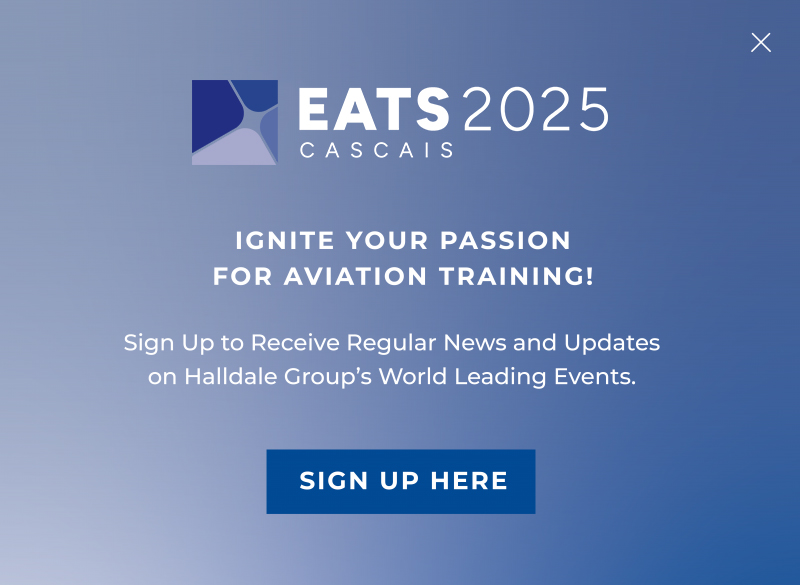Meet the Speakers
Find out more about the EATS 2022 speakers …

Filip Aerts, Head of Training, Brussels Airlines
Filip started his flying career end of 1997 on Bae146/Avro RJ. Since 2010 he flies on A320 and A330. On all flown types he has been qualified as TRI/TRE. Since 2018 he has been appointed as senior examiner for the Belgian Aviation Authorities.
Filip worked as technical pilot on the Airbus fleet till 2018. In 2018 he transferred from flight operations department towards training department and became Nominated Person Crew Training. Besides the NPCT role he acts as Head of Training for the Brussels Airlines ATO.
Under his lead Brussels Airlines became the first Belgian operator granted an approval for EBT. Currently still in mixed EBT the company aims for baseline implementation in 2025. Parallel to the introduction of competences for pilots Brussels Airlines defined a competency framework for cabin crew, which has been implemented since end 2021.
Cabin Crew Conference
Day 1 – Tuesday 8th November 2022 – Session 3

Philip Baum, Managing Director, Green Light Ltd. & Visiting Professor, Aviation Security, Coventry University
A security professional with an international civil aviation background, Philip’s reputation is built on his common-sense approach to risk management. He encourages others to think outside the box and develop effective security solutions capitalising on human intuition and the intelligent use of technology.
In 2021, he was the recipient of the Lifetime Service to Aviation Security Award presented by Emirates Group Security and Edith Cowan University.
Philip devised and developed T.R.A.P.® (Tactical Risk Assessment of People), a risk-based security system based on non-racial profiling, observational and questioning techniques. He has developed and chaired conferences, including Behavioural Analysis (2018, Cardiff; 2019, Minneapolis; 2020, Online; 2022, Northampton), DISPAX World, addressing unruly airline passenger behaviour (2009, Istanbul; 2014, London; 2019; London), and Body Search (2015, London).
He was an expert witness in the United Kingdom’s House of Commons’ Home Affairs Committee inquiry into aviation security in the aftermath of the attempted downing of an aircraft by a suicide bomber on Christmas Day 2009.
He is a visiting professor of Aviation Security at Coventry University. He is an accredited instructor and courseware developer for both the Airports Council International (ACI) and the International Air Transport Association (IATA), for whom he has led projects around the globe.
Philip devised and delivers the Inflight Security courses for IATA.
Philip was editor-in-chief of the global journal of airport and airline security, Aviation Security International, between 1997 and 2021. He also appears on CNN, Sky News and the BBC, providing expert comment on aviation security issues.
In 2016, his book, Violence in the Skies: a history of aircraft hijacking and bombing, was published.
Cabin Crew Conference
Day 2 – Wednesday 9th November 2022 – Session 6
Inflight Security Challenges

Sarah Barry, Director of Education, Senior Lecturer, Airline Pilot, Buckinghamshire New University
Sarah Barry is an experienced airline pilot, currently a Senior Lecturer and Director of Education in the School of Aviation and Security at Buckinghamshire New University, High Wycombe, UK. Her experience includes holding the position of Chair of the Pilot Training and Licensing Committee at BALPA, contributing to IFALPA Human Factors committee papers, and attending the IFALPA Female Pilot Working Group. Sarah is an early stage researcher. Having presented to the BNU Research Colloquium and to the Royal Aeronautical Society, Sarah is now disseminating early findings more widely.
Pilot Conference
Day 2 – Wednesday 9th November 2022 – Session 7
Moving the Female Pilot Agenda Forward
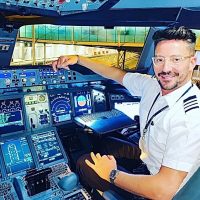
Stuart Beech, CEO & Founder, Resilient Pilot
Stuart is CEO and Founder of Resilient Pilot. Resilient Pilot is a volunteer run not-for-profit initiative created to help pilots and cabin crew be supported, keep current and stay connected with the airline industry. As a British Airways Senior First Officer, Wellbeing Officer, CRMT and CBTi and qualified Mentor/Coach, Stuart has shown a keen interest in CBTA/EBT and resilience development methodologies since it’s introduction to pilot training and CRM in 2013.
Born during the Pandemic, Resilient Pilot pioneered introducing The Resilience Development Programme, a virtual blended mentoring, coaching and training competency based approach to continuous personal and professional development. Resilient Pilot is proud to partner with The Centre for Aviation Psychology in their joint quest to operationalise resilience development by empowering pilots to take personal ownership through The Resilience Hub.
Pilot Conference
Day 2 – Wednesday 9th November 2022 – Session 6
Defining, Operationalising, and Empowering Resilience Building in Pilots

Aedrian Bekker, Director: Organisation Solutions & Business Development, Centre for Aviation Psychology
Aedrian is a Chartered Clinical and Organisation Psychologist. He is registered with the Health and Care Professions Council and is a member of the British Psychology Society.
While Aedrian started his career as a clinician in the NHS, for the past 16 years he has worked with senior leaders and their teams in blue chip companies around the globe. With an expertise in human behaviour in complex organisations, he has worked in heavily regulated and customer sensitive industries such as defence, nuclear, automative, finance, telecommunications, utilities, industrial relations and of course, aviation.
Aedrian leads a team of psychologists and consultants that have designed and delivered award winning psychological interventions that have been credited for their innovation, integrity and user engagement. In British Airways for example, this includes working with over 2000+ flight crew as well as programmes for all senior cabin crew and facilitation of joint Management and Trade Union projects. As a psychologist, he has a deep insight into the unique challenges facing a highly professional and largely remote workforce – and the organisational contexts within which they work.
Aedrian’s team use traditional methods alongside emerging technologies to create scalable and effective psychological solutions.
Pilot Conference
Day 2 – Wednesday 9th November 2022 – Session 6
Defining, Operationalising, and Empowering Resilience Building in Pilots
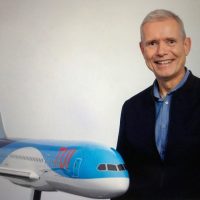
Captain André Berger, Head of Flight Operations and Training, TUI Airline
Capt. Berger is presently the Head of Flight Operations and Training TUI Airline (5 AOC’s), and TRI/TRE on B737/767/787, CRM instructor and has more than 20,000 hours. He also still holds FI, FII, IRI and aerobatics instructor ratings.
He started his career in General Aviation, entered the airline world as Flight Engineer and moved up to First Officer then Captain and TRI. While flying the line he remained very active in the ab initio world, becoming the first Chief Instructor of the Belgian Aviation School, the ab initio school for the now defunct Belgian flag carrier and later became the Senior VP of the Sabena Airline Training Center in Scottsdale, AZ. That school is now part of the CAE global academy.
He then became Training Manager of Sobelair, a charter company followed by the role as Director Flight Operations of TUI Belgium. He is now the Head of Operations and Training for TUI Airline leading a team of Nominated Persons in 5 different AOC’s to create a common TUI Airline group approach for safe, secure, compliant and legal flight operations and crew training.
This unique experience of ab initio, airline training and management makes him the right person to discuss the big picture of pilot supply.
Keynote Address
Day 1 – Tuesday 8th November 2022

Captain Jean-Michel Bigarré, Founder & President, AMFTA
Jean-Michel leads AMFTA as Founder & President, drawing upon 30 years experience in aviation and flight training. In 2019, he founded AMFTA as part of his vision to improve flight safety via the creation of a harmonised flight training level worldwide (Airbus Flight Training reference).
Previously, Jean-Michel was Head of Flight Training Worldwide & VP Training and Flight Ops, for major jet and turboprop airline manufacturers and has held executive positions including CEO & Member of Executive Board for different aircraft and simulator companies. During this time he was instrumental in developing training technologies whilst growing business revenue through innovative solutions, all the while focusing on enhancing flight safety. His wide airline experience also extends to the start-up and restructuring of several airlines.
Jean-Michel graduated at Air France and the French Civil Aviation University (ENAC) and began his career working for a major European airline, before joining the French Aviation Authorities to manage ab initio & advanced training. Throughout his career, Jean-Michel has flown for many different airlines and still flies on a regular basis. He is current on the A320/A330/A350 & A380 and is still acting as Instructor and Examiner on both Airbus aircraft and light aircraft.
Pilot Conference
Day 1 – Tuesday 8th November 2022 – Session 2
The Aircraft Manufacturer Flight Training Association and Strategy
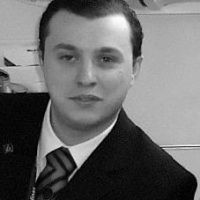
Cedric Buch, Cabin Instructor/CBTA Expert
Cedric Buch is a CBTA-expert for the Brussels Airlines cabin crew training department and participating in several projects regarding competency based training and assessment for cabin crew members, both for Brussels Airlines and within Lufthansa Group Aviation Training. He has been an active cabin crew member for 16 years, and has flown on multiple types of aircraft, ranging from short haul to long haul operations. Currently he is still actively flying for Brussels Airlines on A32F-operations as a purser and instructor.
Due to his academic background, Cedric initially took up responsibility as a CRM-instructor and subsequently expended his curriculum as inflight instructor. Since 2020 he has actively participated in several projects within the Brussels Airlines training department. Cedric was one of the first cabin crew CBTA-instructors and has assisted the Nominated Person crew training and the cabin crew training manager with introducing a cabin crew competency framework, which is currently implemented for training and checking cabin crew members during operations. Currently Cedric is assisting with the implementation of competency-based training and assessment for the Brussels Airlines recurrent training programme.
During EATS Cedric is supporting Filip Aerts, Nominated Person crew training Brussels Airlines, as a subject matter expert regarding CBTA.
Cabin Crew Conference
Day 1 – Tuesday 8th November 2022 – Session 3
Cabin Crew Conference
Day 1 – Tuesday 8th November 2022 – Session 4
CBTA/EBT Workshop for Cabin Crew
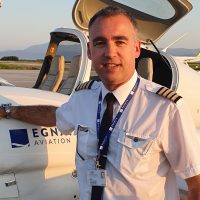
Captain Hugues Carpentier, Head of Training, Egnatia Aviation
A flight instructor for over 24 years, post holder for over 12 years, holding EASA and FAA licenses plus numerous national validations, as a career instructor and flight training manager he has taught and flown over 3 continents and 6 countries, acquiring a broad knowledge and experience of the differences between governing authorities, licensing systems, schools’ curriculums, and educational methods. Actively involved in the Cadet’s selection programs of partner airlines Wizz Air and Aegean/Olympic.
Pilot Conference
Day 2 – Wednesday 9th November 2022 – Session 7
Airlines Involvement in Ab-Initio Training: A Recipe for Success

Carlin Clarke, Facilitator, Leadership Development & Engagement, Breeze Airways
Carlin grew up in the airline industry where she developed a fascination and appreciation for travel, foreign languages, and people from all walks of life. She enjoyed a 17-year career with Delta Air Lines as a Flight Attendant/Purser. Based primarily at JFK, she was responsible for inflight operations to international & domestic destinations.
Carlin’s passion for aviation led to a master’s degree in Commercial Aviation Management. She joined the Department of Aviation Science at Utah Valley University as an adjunct faculty in 2009 where she teaches Principles of Aviation Management, Crew Resource Management (CRM), and Ethical & Professional Issues in Aviation. Additionally, she mentors aviation students in the university’s LEAD program, helping students acquire and practice industry leadership skills, and serves as the Point-of-Contact for anything Flight Attendant related.
Currently, Carlin is a Ph.D. Candidate in Human Capital Development at the University of Southern Mississippi where she is able to combine her interests in people, performance, and aviation. Her research combines specialities in leadership, CRM, and Emotional Intelligence (EI) within the performance improvement context. In 2020, Carlin began consulting with new David Neeleman start-up, Breeze Airways, who this year ranked #2 for Travel & Leisure’s Best Domestic Airline. Carlin recently joined the airline full-time as the new Facilitator, Leadership Development & Engagement.
Cabin Crew Conference
Day 1 – Tuesday 8th November 2022 – Session 2
A More Leaderful Workforce for Effective Passenger Management in the Post-Covid Environment

Mark Collins, Business Development Director - Simulation, Epic Games
Mark had a lengthy military career, involving training and simulation, for all levels of individual and collective training. His second career expanded his knowledge of simulation with a number of defence companies and a variety of roles. As Head of Business Development at Training and Logistics Solutions, Lockhed Martin, Mark was responsible for all domains, Land, Air and Maritime as well as being a student at the Royal College of Defence Studies in 2018.
Mark joined Epic Games in 2020 and leads global business development for the Simulation vertical focused on Defence, Civil aviation, Healthcare, Autonomous vehicles and Robotics.
Pilot Conference
Day 2 – Wednesday 9th November 2022 – Session 8
Using Game Engines for Next Gen Flight Simulation

Trevor Dale FRAeS, MCIEHF, Managing Director, Atrainability Ltd.
As one of the founding members of British Airways pilot Crew Resource Management trainer team, Trevor has been developing training courses and delivering practical human factors awareness and more advanced courses since 1991.
Trevor began introducing human factors concepts to healthcare professionals in 2002 with paediatric cardiac surgery and now continues to do so across the entire spectrum including maternity, surgery, ICU, mental health and other healthcare teams.
Trevor has been active in development of research and training initiatives in healthcare, aviation and other safety-related industries including nuclear power generation.
He has collaborated on several research projects in healthcare, including at Great Ormond Street and Oxford University Hospitals, focussing on learning from error and success.
His passion is to help professionals develop and maintain their full range of skills, both technical and non-technical. He is helping others to introduce human factors integration into child protection social work.
In 2022 he is developing implementation of a neuro-science-based digital learning methodology for HF and Quality Improvement Science blended for several healthcare providers, both public sector and private.
He continues to fly for fun and is a committed voluntary worker within his local community.
Cabin Crew Conference
Day 2 – Wednesday 9th November 2022 – Session 5
Making Memories Sticky – Writing to the Long-Term Memory

Jason Davenhill, Flying Instructor & Performance Coach & Supervisor, Inflow Performance Ltd.
Jason Davenhill’s formative years were as a track athlete where he learned the value of continuous focused improvement. This ethos shaped his subsequent career in the Royal Air Force which he joined after winning his green beret in the Royal Marines. He initially struggled in flying training – quite possibly because the style of flying instruction didn’t necessarily suit him – but, having scraped through he operated the Chinook in most of the RAF’s adventures in the late 90s early 2000s operating on land and, at sea with the Royal Navy, in Bosnia, Kosova, Sierra Leone, Iraq, Afghanistan, Falkland Islands, Northern Ireland, Norway and Brunei. He became an instructor first on the Chinook conversion unit and then on the front line before moving on to run a university air squadron, teaching university students to fly. He became the Deputy Chief Instructor at the Army Air Corps school of aviation where he introduced performance coaching and then moved to the Defence Helicopter Flying School where he instructed on the Griffin Bell 412 and led the performance coaching team. Leaving the regular RAF, he taught university students again and turned all his military qualifications into civilian ones and he now teaches helicopters and fixed wing students and fixed wing instructors.
He is probably one of the few people to have taught at every level in the military, all three armed services, and civilians on fixed wing and helicopters. He is now an executive and performance coach, coaching supervisor and Human Givens psychotherapist. He is lucky enough to have a deep interest and some useful experience in how we learn and what works. Flying instruction, like coaching, is about providing a safe environment for someone else to do their own learning.
Jason has been public speaking for 20 years encompassing a wide range of groups from schools and youth groups, Women’s Institute to large professional fora inside and outside the military. He includes in his list of hobbies a love of stage acting and performance and has formed and led several wind bands and choirs.
Pilot Conference
Day 2 – Wednesday 9th November 2022 – Session 6
Aircrew Performance Coaching – Allowing Pilots to Teach Themselves

Katarina Esko, Cabin Safety Officer, Finnair
Passionate about resilience and leading emotions ever since starting her career in aviation in 2011, Katarina has been training professionals on these topics in aviation, and also in other industries for the past couple of years. She holds a master’s degree in science (technology) and in business administration.
Cabin Crew Conference
Day 2 – Wednesday 9th November 2022 – Session 7
Developing Resilience Through Cabin Crew Training
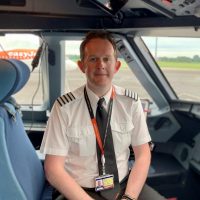
Mark Farquhar, Chief Training Captain, easyJet
With over 12 years experience in easyJet in a variety of roles, Mark provides leadership for both pilot and cabin crew training teams, supporting over 600 instructors delivering training in over 28 locations throughout Europe. He has experience in airline pilot and cabin crew training; operational standards and safety investigation. He actively instructs in the classroom, aircraft and simulator and flies the line.
His main focus is on continually improving training effectiveness and efficiency to better serve the airlines cabin crew and pilots, to equip them with the competencies and confidence to excel in their roles. He has been instrumental in enhancing how pilots and cabin crew are trained within easyJet: ensuring that over 12,000 crew develop competencies to safely and effectively manage any unforeseen situation.
A graduate of the University of Aberdeen with a Master of Arts with Honours in Business Management, he gained experience in public relations within safety critical organisations in the Oil & Gas sector and the Emergency Services. Prior to joining the fixed-wing industry, in the rotary sector at Bristow Helicopters he led a transformational turn-around of an operational control team, improving the operation and regaining key client confidence.
He has been an active participant in a number of industries panels, including the UK CAA Flight Operations Training Standards Group; UK CAA Human Factor Advisory Panel & IATA Evidence Based Training Task Force.
Cabin Crew Conference
Day 1 – Tuesday 8th November 2022 – Session 3
Pilot Conference
Day 2 – Wednesday 9th November 2022 – Session 5

Angela Gallorini, EASA
Angela joined EASA in 2010; she holds a university degree in political and social sciences.
She worked one year for the European Centre for Disease Prevention and Control (ECDC) in Sweden and three years for the European Commission in Italy.
Approximately 16-year experience as a cabin crew member (1990-2006), 10 of which as a senior cabin crew member, for a long-haul Italian charter/scheduled flight airline. During this period she experienced working with mixed aircrews from European, Middle Eastern and African air carriers (wet leasing in and out).
Cabin Crew Conference
Day 1 – Tuesday 8th November 2022 – Session 2
Initial Cabin Crew Training, Fostering Harmonisation

Birdy Raghoonundun Gunputh, Product Manager Safety Training, Lufthansa Aviation Training GmbH
Raghoonundun Gunputh (Nickname: Birdy) is the Product Manager Safety Training at Lufthansa Aviation Training, where his main area of responsibility is to manage the product portfolio for SEP, CRM, Security and First Aid training. Furthermore, he also contributes to the definition of policies and standards of safety training for the Lufthansa Group Airlines.
He holds a degree in Master of Business Administration (MBA) from the Open University UK.
In his past 34 years’ experience within the airline industry, Birdy started as a cabin crew on long and short haul and afterwards spent 24 years in the field of safety training. During this period, he gained the competencies as a SEP, CRM and Security Trainer and took over the role of Manager Crew Safety Training at different airlines for 19 years before joining Lufthansa Aviation Training. Within this journey, he has been involved in enhancing the design and delivery of safety training in an ever-changing operational environment.
As a member if the ICAO Cabin Safety Group, Birdy extends his engagement in the field of safety and training in the airline industry.
His latest projects have been to introduce VR Technology at Lufthansa Aviation Training for cabin crew, implement CBTA principles and explore means of implementing innovative training solutions through ongoing projects.
Cabin Crew Conference
Day 2 – Wednesday 9th November 2022 – Session 5
Training Re-Imagined: The Next Level

Lex Rock Heemstra, Human Factors Specialist, Independent Human Factors
Lex Rock Heemstra started his career in the South African Navy as a Submariner and Diver. He then joined the South Africa Air Force and flew taildraggers and helicopters as an A Cat Instructor and Maintenance Test Pilot. During this time he developed the South African Air Forces in house Aviation Safety courses regarding Flight Safety Officers, Aircraft Accident Investigators and Crew Resource Management Instructors which was attended by over 12 African Air Forces. He holds a Military Management Degree as well as an Honours Degree in Industrial and Organisational Psychology. In 2007 he joined Emirates Airlines as a Human Factors Specialist with the responsibility of developing CRM courses for both Flight Deck and Cabin Crew. In 2015 he joined Qatar Airways as the Vice President Human Factors where he led a team of 3 HF managers and 48 Flight Deck and Cabin Crew CRM Instructors. He has presented at over 32 conferences worldwide and took an early retirement in 2018. However, he is still active in the role of Human Factors and continues to consult, advise and write articles. This is his fourth EATS appearance.
Pilot Conference
Day 2 – Wednesday 9th November 2022 – Session 5
Evaluating Pilots: A Flaw in Judgement
Cabin Crew Conference
Day 2 – Wednesday 9th November 2022 – Session 6
Unruly Passenger – De-Escalating the Situation Before it Gets Worse
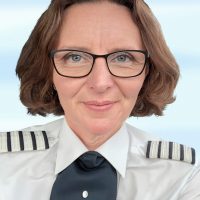
Helen Heenan, Human Factors Specialist
Helen was educated at The Ladies’ College in Guernsey, and obtained her commercial pilot’s licence from the Cabair College of Air Training in January 1999. In May of that year she joined Jersey European Airways, the airline that later on became Flybe.
Following 7 years as a First Officer on the Dash 8 and BAe146, she gained her command on the Q400 in 2006, and in 2007 she joined the CRM team as an instructor delivering recurrent CRM training to flight deck and cabin crew. Returning from a maternity break in 2013, she then began delivering the more comprehensive Initial Operator’s CRM training for both Flight Crew and Cabin Crew.
In 2016 she was appointed the Head of the CRM training department. In this role Helen led, trained and managed a team of 12, and was responsible for the creation and delivery of all the initial and recurrent courseware for the company’s 1700 aircrew, many of whom were new recruits to commercial aviation. She was invited to sit on the company Training Policy Group to ensure that course materials were responding to identified training needs.
Her work has been acknowledged by the UK CAA as ‘The most engaged class observed for a very long time’, and from external clients as ‘The best delivery of CRM I’ve ever seen’.
Helen remained at Flybe for over 20 years, until when in March 2020 she was made redundant following the sudden collapse of the regional airline.
She then worked for 2 years as an independent training consultant, specialising in all aspects of CRM training for a number of airline operators, and training new, and upskilling existing CRMTs, into her passionate and motivational style.
Pilot Conference
Day 2 – Wednesday 9th November 2022 – Session 6
“It’s Okay To Not Be Okay” (and Other Platitudes)

Peter Hogston, Head of Training, L3Harris Commercial Training Solutions
Peter Hogston is Head of Training at L3Harris Commercial Training Solutions operating within the Business Segment covering: Integrated Mission Systems – which includes commercial aviation training solutions.
Peter assumed the role of Head of Training on the 1st July 2022. Reporting directly to the Vice President & General Manager of Airline Academy, the role maintains oversight of delivery against Legal and Regulatory requirements, the client’s demands and the business needs.
Previously, Peter was employed as a Training Standards Captain with particular focus on Boeing clients, products and courseware whilst maintaining a training and examining role for the B737 and A320 operators.
Before joining L3Harris, Peter worked for operators in the UK and Middle East in operational and senior management roles, managing safety and operational performance.
Peter has operated rotary and fixed wing aircraft in a number of environments and worked with National Aviation Authorities, commercial and military operators at executive level as an advisor on regulatory change and implementation strategies.
Peter is Qualified Commercial Pilot with Training and Examining Qualifications on B737 and Airbus A320 aircraft.
Pilot Conference
Day 2 – Wednesday 9th November 2022 – Session 7
Training the Next Generation

Alexandra James, Analysis Output Manager, Osprey Flight Solutions
Alexandra James is the Analysis Output Manager for Osprey Flight Solutions. She ensures the quality of the work produced by the analysis team and contributes to its analytical output, with a focus on migration security issues, including human trafficking, people smuggling and the use of fraudulent documentation. She joined Osprey from Green Light Ltd. where she was the sub-editor and regular contributor of the trade journal, Aviation Security International. In addition to her editorial duties, she also participated in delivering crew training in topics such as unruly passenger management (de-escalation and restraint techniques), advanced interview techniques and behaviour analysis. In 2020, she also completed an MA in Forensic Linguistics at Cardiff University, with her dissertation focusing on communication between crew and aggressive airline passengers.
Cabin Crew Conference
Day 1 – Tuesday 8th November 2022 – Session 2
A Situational Awareness Update of Human Trafficking and Migrant Smuggling into the EU and UK

Audrey Jeffroy, Sales Director, ALSIM Simulators
Audrey joined ALSIM 20 years ago and she is passionate about training in aviation. Traveling around the world, Audrey has met with many Flight Schools, universities and air forces, forging close relationships. A highlight of these travels has been meeting exceptional instructors and Flight Training providers. This has been key in helping Audrey develop an understanding of what is truly important for Flight training providers.
ALSIM has been developing and manufacturing FAA and EASA certified FNPT II, FNPT II MCC and AATD flight simulators since 1994.
ATO Breakout Session
Day 1 – Tuesday 8th November 2022 – 1630-1800
Advanced Simulation in the Context of Sustainability
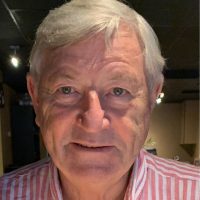
Trevor Jensen, Aviation Management Consultant, Trevajan Consulting
Beginning his aviation career in 1969 as graduate of No.5 Qantas Cadet Pilot Course, Trevor flew B707, B747 and B767 aircraft for the Company holding Command and Check Pilot status on the latter two types.
He was the Technical Director of the Australian International Pilot’s Association for two years prior to being appointed to the Qantas Flight Operation’s management team in 1984. Between 1984 and 1996, he held several senior appointments included Superintendent Flight Safety and General Manager B747 Operations.
Trevor resigned from Qantas in November 1996 to take an appointment as the Executive General Manager Operations and Inflight Services at Ansett Australia. Since 2001, he has held “C” level appointments in large international/Domestic airlines, Low Cost airlines and freight airlines within Australasia, Asia and Europe.
He was a member of the Flight Safety Foundation team responsible for the development and implementation of the highly successful Basic Aviation Risk Standard (BARS) program.
During his career, he has held regulatory responsibility for Air Operator Certificates (AOC) and Certificates of Approval (Maintenance) issued by the Australian Civil Aviation Safety Authority (CASA), the New Zealand CAA and the Myanmar DCA.
With strong commitment and passion for educating future aviation professionals, Trevor has held appointments in academia at several Australian Universities and has served as a member of the Aviation Study Group of Linacre College at Oxford University.
From 1988 to 1996, he was a member of the Board of the Royal Flying Doctor Service (SE Region), serving the latter two years as Vice President. More recently, he was a member of the RFDS (Qld Section) Risk and Compliance Committee.
During 2015, he was the ‘start-up’ CEO of FMI Air, a domestic RPT airline operating in Myanmar. Most recently, he was Chairman of the Board of Nauru Airlines Corporation.
Trevor is a Fellow of the Royal Aeronautical Society, a Fellow of the Australian Institute of Navigation, a Fellow of the Chartered Institute of Transport, Honorary Fellow of the Safety Institute of Australia and a Liveryman of the Guild of the Honourable Company of Air Pilots. In 1999, he was awarded a Master Air Pilot certificate by the Guild of Air Pilot and Navigators of London and in 2001, the Grand Master’s Australian Medal by the Guild.
Cabin Crew Conference
Day 2 – Wednesday 9th November 2022 – Session 5
The Cabin Crew Role in Reduced Flight Crew Operations

Allyson Kukel, Head of Airline Engagement, Halldale Group
Allyson Kukel MRAeS, Leader of Airline Engagement for the Halldale Group, where she works closely with training leaders worldwide to address the changing landscape of aviation. She began her aviation career at Fokker Elmo supporting the Boeing program, which took her to Beijing and laid the foundation for the work she did for Rockwell Collins at Bombardier and Learjet in Montreal. In 2013 she moved to a start-up in the Netherlands, honed her training and simulation knowledge, and found her passion for aviation training at CAE.
She is the product owner of the Big Data collaborative effort between the Halldale Group and the Aircrew Training Policy Group (ATPG), a European Union Aviation Safety Agency (EASA) sub-group.
Allyson is the Founder of Rooted in Calm. She holds a Bachelor’s in Business Administration from the University of Lincoln, and is a certified NLP Master Practitioner, Emotional Intelligence, and Motivational Coach, EMCC certified. She is a mentor at Resilient Pilot and a member of the Royal Aeronautical Society and the European Association for Aviation Psychology (EAAP).
Cabin Crew Conference
Day 2 – Wednesday 9th November 2022 – Session 6
Leave Worry at the Gate: Simple Tools to Build Resilience

Captain Stéphan Labrucherie, Airbus Head of Flight Training Worldwide
Stéphan started his flight training in 1991 with initial pilot training in France & the USA and then started his career in 1994 flying on different turboprop operations. From 1997 to 2004 he flew for French Charter operators on the B737 & A330, before joining 2 national carriers in the United Arab Emirates and also in China flying the A320 & A330.
Stephan joined Airbus in 2011 as TRI on the A320/A330 and became Head of TRIs & Head of Airbus Europe Training Centre prior to his current position.
He is current on A320 A330 A350 & A380 as well as TRI & TRE on A320 A330 & A350.
Since 1995 he has been particularly involved in Human Factors, CRM and Emergency Response system research and training, as well as the implementation of new training concepts such as CBTA.
Pilot Conference
Day 2 – Wednesday 9th November 2022 – Session 5
The Importance of Monitoring

Thomas Leoff, M.Sc., Chair, International Association of Aviation Personnel Schools (IAAPS)
Thomas Leoff is the chair of the International Association of Aviation Personnel Schools (IAAPS) and Manager Training Standards within Lufthansa Aviation Training. He has been in the aviation training business since 1991 and is a recognized expert in day-to-day practical training management as well as in the field of developing the future training environment. Since 201, he is a Fellow of the Royal Aeronautical Society.
He is a member of EASA’s Stakeholder Advisory Board (SAB) and in this function an industry observer in the EASA Management Board’s PAR group (Programming and Resources Advisory Group).
He is the chair of EASA’s Flight Standards Technical Committee (FS.TEC) and a member of the Aircrew Training Policy Group (ATPG), and FS.TEC sub-group. He is also a member of EASA’s Commercial Aeroplane Safety Committee (CAS.COM).
He is actively involved in RMT.0194 and EASA’s task force on the integration of Theoretical Knowledge Instruction and Practical Training in integrated ATP courses.
ATO Breakout Session
Day 1 – Tuesday 8th November 2022 – 1630-1800
Challenges and Possible Solutions for Commercial Pilot Training in 2023 and Beyond

Captain Olivier Mazzoleni, Deputy Head of Airbus Training Worldwide, Regulatory & International Affairs Manager, Airbus
Capt. Mazzoleni is deputy Head of Airbus Training Worldwide & Regulatory and International Affairs Manager. He is in charge of the Competency-based Training and Assessment (CBTA) and Evidence-Based training (EBT) expansion within Airbus Training. He is actively involved in different international expert groups or organizations developing Competency-based Training and Assessment standards.
He joined Airbus in 2011 after spending time with the French Civil Aviation Authority (DGAC) and a flying career on the French Air Force Airbus fleet. In Airbus Training, he held successively the positions of Head of Airbus Flight Instructor Standardization and Head of Airbus Flight Training Policy.
He is currently a qualified instructor, examiner and senior-examiner on A320, A330, A340 and A350.
Pilot Conference
Day 1 – Tuesday 8th November 2022 – Session 4
Competency-Based Training and Assessment Expansion

Michael Miller, Director, Learning Programs, Commercial Training Solutions, Boeing Global Services
Michael Miller is the Director of Learning Programs within Commercial Training Solutions for Boeing Global Services, responsible for the design and development of Boeing’s commercial flight, maintenance and early career learning programs. Miller has played a critical role in the developmet of Boeing’s Competency Based Training and Assessment program.
Miller is an experienced pilot and joined Boeing in 2018 as the Program Lead, Fleet Training Development. He has worked as the Manager of the Fleet Training Development Team and the Senior Manager of the Learning Design team, where he led design, development, sustainment and deployment of Boeing’s commercial flight training programs.
Prior to joining Boeing, Miller served in the United States Air Force as a Command Evaluator Pilot, Squadron Commander and Group Commander, retiring in the rank of Colonel.
During his U.S. Air Force career, Miller led C-130 operational flying squadrons in the United States and Afghanistan, was the Director for Air Mobility for United States Air Forces Central Command and was the C-130 Training Operations Group Commander and Commandant, where he was responsible for all C-130 pilot and loadmaster training for the US Air Force, as well as many other Department of Defense and international partners.
Pilot Conference
Day 1 – Tuesday 8th November 2022 – Session 4
CBTA Value and Challenges: The Voice of the Customer

Ian Mitchell, Lead Cabin Crew Training Designer, Air Canada
Ian began his aviation career as a flight attendant with Wardair Canada in 1988. In 1990 Canadian Airlines International bought and merged with Wardair. In 1994 he joined Air Crew Training at Canadian Airlines as an Instructor/Developer. After a few years in this position, he discovered his real passion was for training design. When Air Canada bought Canadian Airlines in 2000, the training department was reorganized, and he became a training designer. Since then, he has served as lead training designer for numerous training programs and other training initiatives.
Ian has presented at EATS 2017 and 2018. He has also moderated interactive group sessions during the “Training Café” portion of EATS 2018 and 2019.
Cabin Crew Conference
Day 2 – Wednesday 9th November 2022 – Session 6
Air Canada’s Approach to Disruptive/Unruly Passenger Training

Captain Andy Mitchell, Chairperson, Aircrew Training Policy Group (ATPG)
Andy’s background and passion spans both technology and aviation training. He has over 16 years and 10,000 flying hours on the A320 family aircraft culminating in a variety of pilot training and management roles. In technology he’s a strong industry advocate of agile software best-practices and how they can be applied effectively to aviation. And, as an expert on CBTA and ABLE, he sits as a member of the IATA EBT Core Group and as an advisor to EASA RMT.0599 and the EASA ABLE concept paper. He is currently the Chairperson of the EASA Aircrew Training Policy Group (ATPG).
Pilot Conference
Day 1 – Tuesday 8th November 2022 – Session 2
Heads of Training Panel Discussion
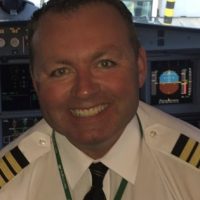
Captain Karl O'Neill, Chief Instructor ATO, Aer Lingus, Secretary, Aircrew Training Policy Group
Karl is an aviation professional with over 23 years in the airline industry. Hailing from Dublin, he studied Business Law at UCD and subsequently completed a Masters in Business Management & Leadership at the UCD Smurfit Business School.
Karl has flown several commercial aircraft namely the Bae146, AVRO RJ, Airbus A319, A320, A321 and Airbus A330. He has held several airline management positions including Chief Instructor, Flight Training Manager and Head of Training.
He presently is Chief Instructor ATO with Aer Lingus in Dublin with Pilot Recruitment under his remit. In his operational capacity, he is a Type Rating Examiner/Instructor on the Airbus A320 fleet. He has been involved in many innovative projects including the introduction of Evidence Based Training, Competency Based Training and MPL Cadet Training at Aer Lingus.
He is also Secretary of the EASA Aircrew Training Policy Group.
He is a keen cyclist and avid sports fan. He spends is free time coaching as a certified GAA and Rugby coach.
Pilot Conference
Day 1 – Tuesday 8th November 2022 – Session 2
Heads of Training Panel Discussion

Juliana Oliveira, Senior Cabin Crew, Vueling S.A.
Juliana Oliveira is a Senior Cabin Crew Member with 10 years’ experience in the aviation industry.
Determined and driven by results. One of the things she finds important are people; specially the crew she works with. For her, it is important that each person she works with will feel empowered, motivated, and able to speak up.
With more than 20 years’ experience on customer service, made her attentive to details and willing to learn from each person and situation. She believes that opportunities must be given to each cabin crew to make sure that each cabin crew will stand out.
With her motivation comes her joyful personality and professionalism. Growth is her desire and each step she takes on the growth ladder is with the purpose to become a voice for those who have difficulties in having one.
Cabin Crew Conference
Day 2 – Wednesday 9th November 2022 – Session 7
Making the Practicals a Practice
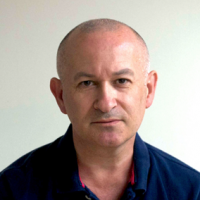
Capt. David Owens, Senior Manager Technical Standards, CAE
David Owens is current on the A320, A330 and A380 family of aircraft with more than 5000 hours in command and around 3000 on Boeing aircraft. He is a TRI/TRE on the A320 and A330 family and formally on the B737 series. His career as an airline pilot now passes 25 years including bmi British Midland as Airbus Training Manager and Chief Training Captain, easyJet.
David holds a Masters degree from the College of Aeronautics, Cranfield and is a Fellow of the Royal Aeronautical Society.
Pilot Conference
Day 1 – Tuesday 8th November 2022 – Session 4
Instructor Training for CBTA: A New Paradigm
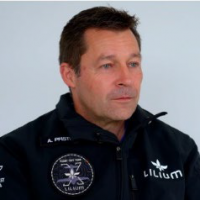
Captain Andreas Pfisterer, Head of Flight Operations and Crew Training, Lilium GmbH
Captain Andreas Pfisterer leads the development of Flight Operations and Crew Training at Lilium GmbH in Munich (Germany).
Currently he is also supporting the flight test campaign as test pilot for the Lilium prototype in Spain.
His background is more than 30 years in commercial operation with Swissair and in Business Aviation, as Pilot, Instructor and in various Top Management functions, as well as Flight Inspector at Swiss FOCA, responsible for certification and oversight of commercial airline operation.
Pilot Conference
Day 2 – Wednesday 9th November 2022 – Session 8
Training Challenges for the New eVTOL Aviation
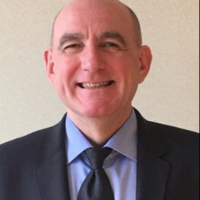
Captain Yann Renier, Head of Training and Licensing, IATA
Capt. Renier is Head of Training and Licensing within the Operations, Safety and Security (OSS) Division at IATA’s Headquarters in Montreal. In this position, he acts as Secretary of the IATA Pilot Training and Licensing Task Force and consequently is in charge of several major training initiatives including the Competency-Based Training and Assessment (CBTA) implementation support and the Evidence-Based Training (EBT) Data Report update. These projects imply Capt. Renier’s active contribution to the development of new international pilot training and licensing standards.
Capt. Renier joined IATA in June 2016 after 26 years of commercial air carrier experience, which included both domestic and international operations. Over these 26 years he held various positions, among which Chief Pilot Compliance and Regulatory Affairs, Flight Standard Management Pilot, Line Training Captain, and Type Rating Instructor & Examiner.
Keynote Address
Day 1 – Tuesday 8th November 2022
Pilot Conference
Day 1 – Tuesday 8th November 2022 – Session 4
Competency-Based Training and Assessment Expansion

Fabian Riesen, CEO, VRM Switzerland
Fabian Riesen is the CEO of VRM Switzerland (VRMotion Ltd). In the last 20 years, Fabi, with a Degree in Electrical Engineering from 1998, has been developing various simulators. In 2014, he experimented to combined virtual reality (VR) with motion platforms. After his eMBA exam in 2016, Fabi has co-founded VRM-Switzerland which has qualified the first VR training device as a type-specific Robinson R22 FNPT II and Airbus H125 FTD level 3 under EASA regulation The company consists of an innovative team of over 30 passionate engineers, highly specialized developers and dedicated aviation experts. All mechanical designs and electronic circuits are designed and coordinated in-house. Another strength of the team is its proximity to flight schools and operators. Since 1999, Fabi has a PPL(A) SEP. During his time off, he enjoys staying with his family and being in the Swiss mountains, whereas he recently climbed all 48 summits above 4000m of the Swiss Alps, shortly before his 48th birthday.
Pilot Conference
Day 2 – Wednesday 9th November 2022 – Session 8
Evidence-Based Training Concepts Implemented on the First EASA Qualified Virtual Reality Training Device

Captain Colin Rydon, CEO, Pilot Flight Academy
Capt. Colin Rydon is Chief Executive Officer and Chief Operating Officer of Pilot Flight Academy AS (PFA). PFA is headquartered in Norway and delivers commercial pilot training to students from around the globe who wish to enter the world of commercial aviation as a pilot. PFA is regarded as one of the leading Pilot Academies in Europe with 2 bases in Norway and 1 base in Texas, USA. PFA currently have over 400 students.
With an aviation career spanning 32 years, Colin has gained broad global experience in flight operations management, pilot training and regulation within all sectors of the aviation industry. Colin joined L3Harris from Flybe, once UK’s largest regional airline where he held the position of Director of Flight Operations. Previously he held senior management positions at Jetstar/Qantas, easyJet and British Airways. Colin’s management career was first built over 20 years at British Airways where he began as a cadet pilot and rose to Flight Training Manager on the largest global B747-400 fleet.
ATO Breakout Session
Day 1 – Tuesday 8th November 2022 – 1630-1800
How Easy is it Finding the Next Generation of Commercial Pilots?

Gert Van Quekelberghe, Cabin Crew Training Manager, Brussels Airlines
Gert Van Quekelberghe is currently the cabin crew training manager at Brussels Airlines. He has been an active cabin crew member for 20 years, and has flown on multiple types of aircraft, ranging from short haul to long haul operations. Currently he is still actively flying for Brussels Airlines A32F- and A330-operations as a senior purser and instructor.
Due to his background in health care, for which he has studied in Ghent and Prague, Gert initially took up responsibilities as a first-aid instructor and subsequently expanded his curriculum as safety instructor.
Since assuming his responsibilities as cabin crew training manager in 2019, Gert has initiated several projects to streamline, modernize, and digitalize Brussels Airlines cabin crew training. This includes the introduction of a cabin crew competency framework, which is currently implemented for training and checking cabin crew members during operations. He is also participating in several projects in the Lufthansa Group Aviation Training.
Currently Gert is overseeing the implementation of competency-based training and assessment for the Brussels Airlines recurrent training programme.
During EATS Gert is supporting Filip Aerts, Nominated Person crew training Brussels Airlines, as a subject matter expert regarding CBTA.
Cabin Crew Conference
Day 1 – Tuesday 8th November 2022 – Session 3
Cabin Crew Conference
Day 1 – Tuesday 8th November 2022 – Session 4
CBTA/EBT Workshop for Cabin Crew
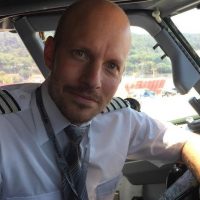
Henrik Wiechel, Nominated Person Crew Member Training, Nova Airlines AB
Henrik Wiechel is the Nominated Person Crew member Training at Nova Airlines AB. He is a professional pilot with more than 20 years’ experience from commercial operation of the Saab 2000, B737 and A320. He is currently Senior Examiner on B737 and A320. His work experience focusses on various training roles including 4 years as Head of Training at Braathens Training ATO and 6 years as Flight Inspector for the Swedish Civil Aviation Authority where Henrik was focal point for FSTD and deputy Section Manager on the section for flight training. Henrik has implemented EBT at Nova Airlines as the first airline in Sweden and will be completing the mixed implementation phase during 2023.
Cabin Crew Conference
Day 1 – Tuesday 8th November 2022 – Session 3
Implementing EBT for Cabin Crew
EATS 2022 Sponsors & Partners


